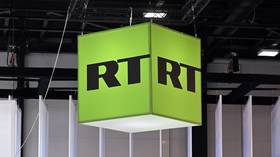Apple ‘planning to ditch Intel’s chips’ in big hardware move
Tech giant Apple is reportedly on the cusp of announcing a shift to its own main processors in Macs, ending a 15-year partnership with Intel Corp. The move comes two years after a major security flaw was found in Intel processors.
The announcement is expected at the Apple Worldwide Developers Conference on June 22, and, according to Bloomberg sources, has been timed to give the company’s developers ample opportunity to adjust to the tech before new Macs come out next year. The new processors will be based on the same technology as the ones in Apple’s iPhone and iPad chips.
Also on rt.com Apple & Google ‘woke-ify’ virtual assistants to educate users on Black Lives MatterThe technology will be licensed from ARM, which is part of Japanese conglomerate SoftBank Group Corp. As the chips have a different configuration to those of Intel, developers will need time to optimise their software to the different underlying technology.
The news has been in the works since at least 2018, when Bloomberg reported that Apple would be using its own chips by 2020.
Apple reportedly decided to make the shift after Intel’s annual chip performance gains slowed. The rumors it was planning to start producing its own chips in lieu of Intel’s also came months after a major security flaw was found in Intel processors produced over the previous decade, affecting millions of computers running Windows, macOS and Linux.
Also on rt.com 'Meltdown' & 'Spectre' flaws affect all Macs and iOS devices - AppleWithin Apple, Macs tested with the new chips have led to increased graphics performance, as well as a better handling of apps that use artificial intelligence, according to Bloomberg. In another blow for Intel, the new processors are also reportedly more power efficient, meaning that slimmer but more powerful Macs may be on the horizon.
In many ways, this is a classic case of reaping what you sow. In 2005, Apple’s partnership with Intel meant that Intel was the chipmaker for both Microsoft and its biggest rival. At the time, Intel turned down an opportunity to provide the processor for the iPhone, believing that Apple was unlikely to sell enough of them to justify the development costs.
Think your friends would be interested? Share this story!













